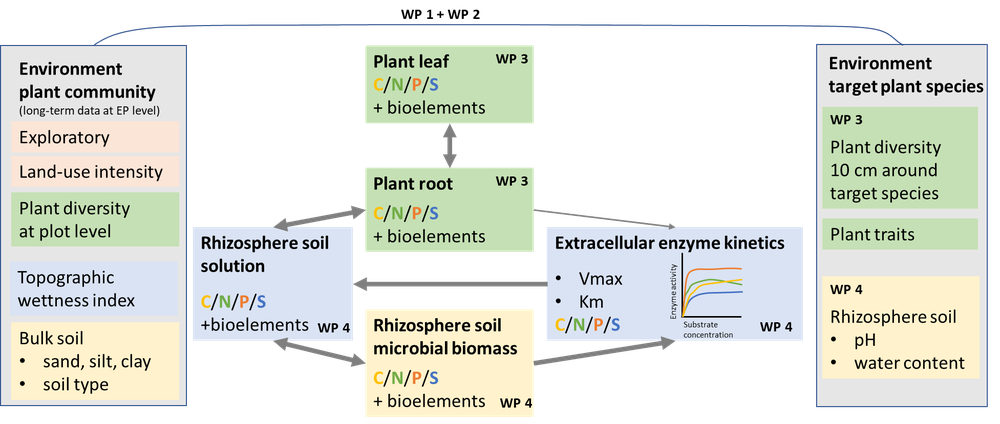PEGasuS
Plant-Enzyme Interactions along Gradients of Resource Stoichiometry

Background
Ecological stoichiometry explores the relationships between organisms and ecosystem function by studying elemantal ratios of organisms and their environment. Ecoenzymes are enzymes in the environment that have broad substrate specificity and are important for various metabolic functions. Based on ecological theories, a coupling between plant, microbial and soil stoichiometries, as well as ecoenzymes is hypothesized. A hotspot of these couplings is the rhizosphere. Anthropogenic land use alters stoichiometric reactions, which may affect plant species distribution.
Aim
PEGasuS targets at disentangling the mechanisms driving the nutrient acquisition of plant species differing in their niche optima along the gradient of land-use intensity (LUI). The aim is to understand how variation in homeostasis or plasticity may constrain the species’ distribution and their competitive abilities in real-world grasslands including respective consequences for ecosystem functioning.
We hypothesize the following:
- Differences in plant homeostasis and nutrient requirements influence their distribution and competitive ability along the LUI gradient.
- Microorganisms and ecoenzymes determine stoichiometric ratios in the rhizosphere.
- Interactions between plants and soil enzymes influence ecosystem processes.
- Experimental reduction of land use intensity affect the plant-rhizosphere-soil system.
Methods
Elemental concentrations of C, N, P, S, and other bioelements in plant leaves and roots, soil rhizosphere, and rhizosphere microbial biomass, as well as enzyme-specific kinetics of C-, N-, P-, and S-specific enzymes will be determined for 12 target plant species with different niche optima along the LUI gradient. Enzyme responses will be determined using an extended Michaelis-Menten approach to investigate the influence of stoichiometric homeostasis on species distribution and their competitive ability in grasslands with different LUI. Plant-enzyme interactions will be investigated on 60 grassland EPs and 45 RPs (reduced LUI plots). The effects of plant diversity and resource gradients on plant-enzyme interactions will be assessed at the plot and individual level. By a combination with data available in Biodiversity Exploratories framework, mechanisms controlling plant-enzyme interactions and their response to LUI gradients can be identified. Thus, PEGasuS will contribute to a more mechanistic understanding of the effects of LUI and LUI reduction on ecosystem functionioning.

Conceptual framework in PEGasuS. For 12 target grassland plant species differing in their LUI niche optima the stoichiometric nutrient requirements of the rhizosphere microbial community and their respective host plant will be assessed and their functional abilities to drive extracellular enzyme kinetics to acquire nutrients from rhizosphere soil solution.
PIs: Prof. Dr. Kleinebecker, PD Dr. Ute Hamer (WWU Münster), Dr. Alexander Tischer (Uni Jena)
PhD: Veronika Irmscher
Laufzeit: 2023-2026
Mittelgeber: DFG
